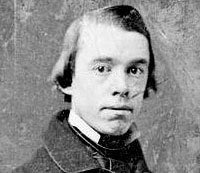Three weeks ago in an
”
Ask Marty
”
column, I mentioned the South Valley’s connection to the Rev.
Thomas Starr King. Intrigued by the man who lived in the mid-19th
Century, I dug deeper and discovered one of California’s most
amazing history-makers.
Three weeks ago in an “Ask Marty” column, I mentioned the South Valley’s connection to the Rev. Thomas Starr King. Intrigued by the man who lived in the mid-19th Century, I dug deeper and discovered one of California’s most amazing history-makers.
South Valley’s own history might have been different if the Unitarian minister hadn’t officiated at the 1862 wedding of Col. William Welles Hollister and his bride, Annie. But more significantly, during America’s Civil War, King played a key role in keeping California in the Union. He also significantly helped preserve our state’s natural environment.
When he was 35, the minister left Boston to voyage to San Francisco and serve as pastor of that city’s First Unitarian church. Standing just above 5 feet tall and weighing 120 pounds, he was an often frail man in health, but an always potent man in heart. And he also possessed a passion for social justice – especially when it concerned the abolition of slavery.
In California, he traveled from town to town lecturing on reasons why the state must stay in the Union. The times were indeed turbulent, with many Californians – including state lawmakers in Sacramento – holding emotional sympathy with the slave states of the Confederacy.
Somehow, King’s lectures convinced many. California stayed in the Union and thus played a pivotal role in the outcome of the Civil War. If it had taken the Confederate path, much of its gold would have gone to financially support the Southern cause. President Abraham Lincoln himself credited King as the man most responsible for making sure California did not secede.
King also did his part to help save the lives of Union Army soldiers fighting in the war. The Union could not provide its fighting men with the most basic provisions such as sheets, blankets and medical equipment. Food sold by war profiteers also often arrived spoiled in military camps.
To solve this problem, King’s reverend friend H.W. Bellows organized the United States Sanitary Commission in New York City, which raised $5 million to buy supplies for soldiers. About $1.25 million of this came from King’s fund-raising in California. The organization King helped found is considered the precursor to the American Red Cross.
When he wasn’t fighting for the nation’s preservation, King somehow found time to fight for the civil rights of African-Americans and Chinese living in San Francisco. He also managed to explore California’s pristine Sierra Nevada, visiting Lake Tahoe and Yosemite Valley. He wrote about these wilderness wonders so vividly that his words helped inspire others, such as John Muir, to work to preserve them.
In Yosemite, despite his frail condition, he climbed a massive dome of granite that hung 13,600 feet above the valley floor. Today, that hunk of rock honors the good minister with the name Mt. Starr King.
The energy King put into his work eventually depleted his health. He died in San Francisco of diphtheria on March 4, 1864 – almost one year before the end of the Civil War. Although he was gone, he wasn’t forgotten. In 1931, Californians shipped to Washington, D.C., a bronze statue of the Rev. King that was installed in Congress’s National Statuary Hall. Along with Father Junipero Serra, he was one of two California heroes given this honor.
Unfortunately, last August the California Legislature decided to replace King’s statue with one commemorating former President Ronald Reagan. Our Sacramento representatives heard no serious debate as they passed their resolution to switch the statues. Certainly, few of these state lawmakers really knew King’s story and the vital role he played in history.
Recently, I called up King’s great, great granddaughter, Ginny King Supple who lives in Southern California. As we chatted about her illustrious ancestor, she told me she believes our nation can learn much from King in regards to protecting the environment and upholding civil rights. We can also take a lesson from him regarding our increasingly growing divide as a nation concerning the Iraq War.
“I imagine it would be a major concern of his that the country is divided,” Supple said. “However he might see it, he’d try to bring the people together on the issues … He’d want to make everybody see the issues in the same light as opposed to seeing everything divided from one camp to another camp.”
Thomas Starr King no doubt could speak volumes to today’s America.













